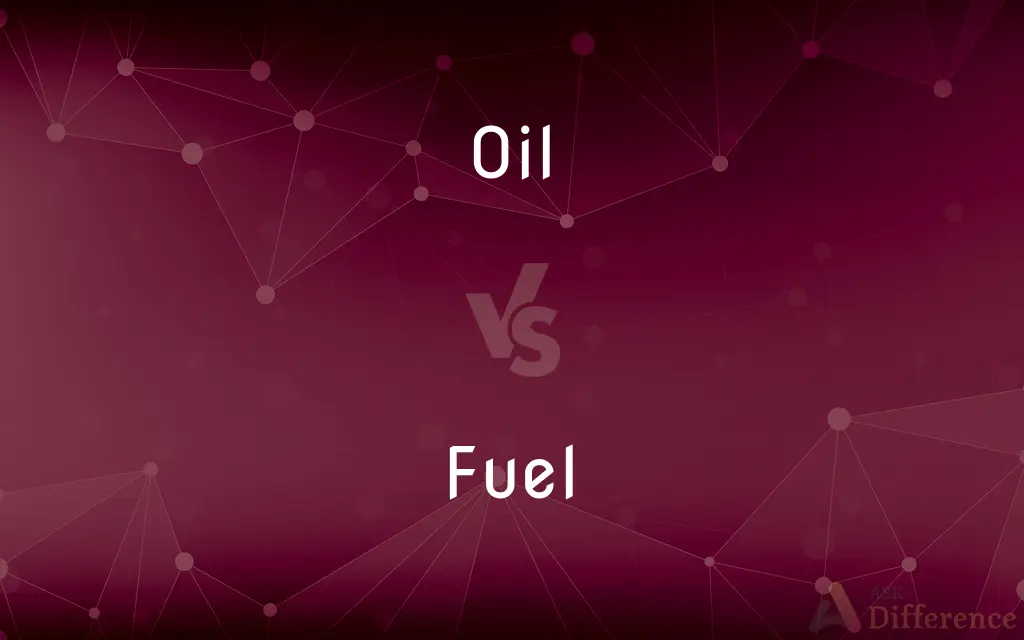Oil vs. Fuel — What's the Difference?
By Urooj Arif & Maham Liaqat — Updated on March 9, 2024
"Oil" is a broad category of viscous liquids derived from organic sources, used in various industries, while "fuel" refers to substances that release energy when combusted.

Difference Between Oil and Fuel
Table of Contents
ADVERTISEMENT
Key Differences
"Oil" encompasses a wide range of viscous liquids, typically organic, that are extracted from geological formations or biological sources. On the other hand, "fuel" is a more general term for substances that can be burned or oxidized to release energy.
Oils can serve various purposes, such as lubrication, cooking, and as a base component in industrial products. Fuels are essential for powering engines, heating buildings, and generating electricity, and they include solids, liquids, and gases like coal, gasoline, and natural gas.
While all fuels are substances that release energy, not all oils serve as fuel. For instance, essential oils used in aromatherapy and cooking oils like olive or vegetable oil are not considered fuels because they are not primarily used for energy production. Conversely, some oils, such as diesel and kerosene, are classified as fuels because their main use is to produce energy through combustion in engines or heaters.
The distinction also lies in their applications; oils can have non-energy-related uses such as in cosmetics, pharmaceuticals, and the production of plastics, whereas fuels are specifically targeted towards energy generation and mechanical work.
Comparison Chart
Definition
Viscous liquid derived from organic sources
Substance used for energy through combustion
ADVERTISEMENT
Primary Use
Lubrication, cooking, industrial products
Powering engines, heating, electricity
Types
Essential oils, vegetable oils, crude oil
Coal, gasoline, natural gas, diesel
Energy Production
Not all oils are used for energy
Specifically used for energy generation
Applications
Broad, including non-energy uses
Primarily for energy and mechanical work
Compare with Definitions
Oil
Extracted from geological or biological sources.
Crude oil is pumped from beneath the Earth's surface.
Fuel
Includes solids, liquids, and gases.
Coal is a solid fuel used in many power plants.
Oil
Used in cooking, cosmetics, and industrial applications.
Olive oil is popular both in culinary and skincare products.
Fuel
Vital for heating buildings and generating power.
Natural gas is a common fuel for home heating systems.
Oil
Key ingredient in plastics and pharmaceuticals.
Certain oils are foundational in the production of various plastics.
Fuel
Combusted to produce energy.
Gasoline is burned in car engines to power vehicles.
Oil
Essential for reducing friction in machinery.
Motor oil ensures smooth engine operation.
Fuel
Powers various modes of transport.
Jet fuel is specifically formulated for aircraft engines.
Oil
Not all oils are used as fuels.
Essential oils are used for their aromatic properties, not energy.
Fuel
Primarily utilized for their energy content.
Diesel fuel is used for its high energy density in engines.
Oil
An oil is any nonpolar chemical substance that is a viscous liquid at ambient temperatures and is both hydrophobic (does not mix with water, literally "water fearing") and lipophilic (mixes with other oils, literally "fat loving"). Oils have a high carbon and hydrogen content and are usually flammable and surface active.
Fuel
A fuel is any material that can be made to react with other substances so that it releases energy as thermal energy or to be used for work. The concept was originally applied solely to those materials capable of releasing chemical energy but has since also been applied to other sources of heat energy such as nuclear energy (via nuclear fission and nuclear fusion).
Oil
A viscous liquid derived from petroleum, especially for use as a fuel or lubricant.
Fuel
A material such as wood, coal, gas, or oil burned to produce heat or power.
Oil
Oil paint
A portrait in oils
Fuel
Fissionable material used in a nuclear reactor.
Oil
Information or facts
Young had some good oil on the Adelaide races
Fuel
Nutritive material metabolized by a living organism; food.
Oil
Lubricate, coat, or impregnate with oil
A lightly oiled baking tray
Fuel
Something that maintains or stimulates an activity or emotion
"Money is the fuel of a volunteer organization" (Natalie de Combray).
Oil
Supply with oil as fuel
Attempts should not be made to oil individual tanks too rapidly
Fuel
To provide with fuel.
Oil
Any of numerous mineral, vegetable, or synthetic substances or animal or vegetable fats that are generally slippery, combustible, viscous, liquid or liquefiable at room temperatures, soluble in various organic solvents such as ether but not in water, and used in a great variety of products, especially lubricants and fuels.
Fuel
To support or stimulate the activity or existence of
Rhetoric that fueled the dissenters.
Oil
Petroleum.
Fuel
To take in fuel.
Oil
A petroleum derivative, such as a machine oil or lubricant.
Fuel
Substance consumed to provide energy through combustion, or through chemical or nuclear reaction.
Oil
A protective or cosmetic liquid applied to the skin or hair.
Fuel
Substance that provides nourishment for a living organism; food.
Oil
Oil paint.
Fuel
(figuratively) Something that stimulates, encourages or maintains an action.
His books were fuel for the revolution.
Money is the fuel for economy.
That film was nightmare fuel!
Oil
A painting done in oil paint.
Fuel
To provide with fuel.
Oil
To lubricate, supply, cover, or polish with oil.
Fuel
To exacerbate, to cause to grow or become greater.
Oil
Liquid fat.
Fuel
Any matter used to produce heat by burning; that which feeds fire; combustible matter used for fires, as wood, coal, peat, etc.
Oil
Petroleum-based liquid used as fuel or lubricant.
Fuel
Anything that serves to feed or increase passion or excitement.
Oil
Petroleum
Fuel
To feed with fuel.
Never, alas I the dreadful name,That fuels the infernal flame.
Oil
(countable) An oil painting.
Fuel
To store or furnish with fuel or firing.
Well watered and well fueled.
Oil
(painting) Oil paint.
I prefer to paint in oil
Fuel
A substance that can be consumed to produce energy;
More fuel is needed during the winter months
They developed alternative fuels for aircraft
Oil
(attributive) Containing oil, conveying oil; intended for or capable of containing oil.
Oil barrel; oil pipe
Fuel
Provide with a combustible substance that provides emergy;
Fuel aircraft, ships, and cars
Oil
(transitive) To lubricate with oil.
Fuel
Provide with fuel;
Oil fires the furnace
Oil
(transitive) To grease with oil for cooking.
Fuel
Take in fuel, as of a ship;
The tanker fueled in Bahrain
Oil
Any one of a great variety of unctuous combustible substances, more viscous than and not miscible with water; as, olive oil, whale oil, rock oil, etc. They are of animal, vegetable, or mineral origin and of varied composition, and they are variously used for food, for solvents, for anointing, lubrication, illumination, etc. By extension, any substance of an oily consistency; as, oil of vitriol.
Fuel
Stimulate;
Fuel the debate on creationism
Oil
To smear or rub over with oil; to lubricate with oil; to anoint with oil.
Oil
A slippery or viscous liquid or liquefiable substance not miscible with water
Oil
Oil paint used by an artist
Oil
Any of a group of liquid edible fats that are obtained from plants
Oil
Cover with oil, as if by rubbing;
Oil the wooden surface
Oil
Administer an oil or ointment to ; often in a religious ceremony of blessing
Common Curiosities
What makes a substance a fuel?
A fuel is any substance that can be combusted or oxidized to release energy, typically for heating, powering engines, or generating electricity.
Can all oils be used as fuels?
No, not all oils are suitable for use as fuels. Some, like essential or cooking oils, are not intended for energy production.
Can fuels be non-combustible?
The primary characteristic of a fuel is its ability to release energy, usually through combustion. Non-combustible substances would not typically be classified as fuels.
How are oils used in industries outside of energy?
Oils are used in a variety of industrial applications, including as lubricants in machinery, ingredients in cosmetics and pharmaceuticals, and as base substances in the production of plastics and other materials.
Is electricity considered a fuel?
Electricity is a form of energy rather than a fuel. It is often generated through the combustion of fuels like coal, natural gas, or the use of nuclear and renewable energy sources.
Are there oils that do not come from organic sources?
Most oils have organic origins, but synthetic oils are created through chemical processes and do not come directly from organic sources.
How are fuels stored safely?
Fuels are stored in specially designed containers or tanks that prevent leaks and reduce the risk of fire or explosion, following strict safety regulations.
Is gasoline considered an oil or a fuel?
Gasoline is derived from crude oil through refining processes and is considered a fuel due to its primary use for energy production in combustion engines.
Can the same substance be both oil and fuel?
Yes, some substances can be classified as both, depending on their use. For example, diesel is an oil used predominantly as a fuel.
What are some examples of solid fuels?
Coal and wood are common examples of solid fuels used in power generation and heating.
Are there environmentally friendly fuels?
Yes, biofuels made from renewable organic materials and alternative fuels like hydrogen can be more environmentally friendly options compared to fossil fuels.
Can oils be renewable?
Yes, some oils, like those derived from biological sources (e.g., vegetable oils), can be considered renewable, especially when produced from crops grown sustainably.
How is fuel efficiency measured?
Fuel efficiency is typically measured by the amount of energy produced per unit of fuel consumed, such as miles per gallon in vehicles or the heat output per unit of fuel in heating systems.
Can the term "oil" refer to any liquid substance?
While "oil" generally refers to viscous liquids, not all liquid substances are considered oils. The term is typically reserved for organic or synthetic liquids used for specific purposes like lubrication, fuel, or in industrial processes.
Do all vehicles use the same type of fuel?
No, different vehicles may use various types of fuels, including gasoline, diesel, electricity, and alternative fuels like biodiesel or hydrogen.
Share Your Discovery

Previous Comparison
Leak vs. Leakage
Next Comparison
Vicious vs. CruelAuthor Spotlight
Written by
Urooj ArifUrooj is a skilled content writer at Ask Difference, known for her exceptional ability to simplify complex topics into engaging and informative content. With a passion for research and a flair for clear, concise writing, she consistently delivers articles that resonate with our diverse audience.
Co-written by
Maham Liaqat













































